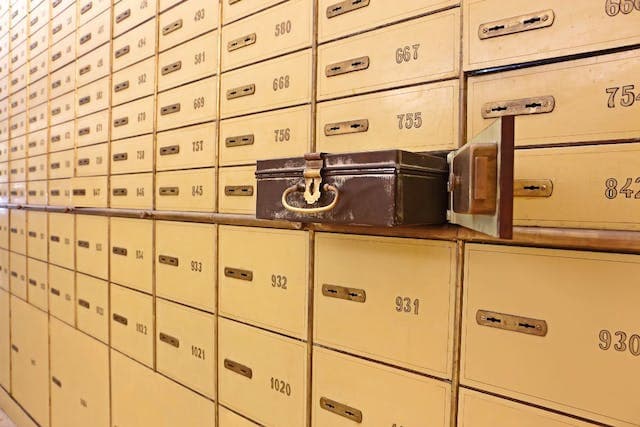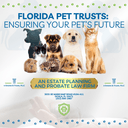
Accessing Safety Deposit Boxes After Death: A Florida Probate Law Guide
- Accessing a safe deposit box in Florida post-death requires adherence to state probate laws.
- Eligible individuals include spouses, parents, adult descendants, or those named as personal representatives.
- Only documents like wills and life insurance policies can be accessed before Letters of Administration are issued.
- To begin the process, gather essential documents and notify the bank, ensuring compliance with legal procedures.
- Seek guidance from a Florida probate estate lawyer for professional assistance navigating these complex legal matters.
In the United States, about 1 in every 13 people rent a safe deposit box, highlighting the significance of this issue. This guide aims to clarify the process of accessing asafe deposit box in Florida probatein compliance with the state's probate laws.
Understanding the rules and regulations governing safe deposit boxes in Florida is crucial for a smooth probate process. Access to the box depends on its ownership.
Joint ownership allows immediate access to a surviving owner. If a safe deposit box is owned solely by the deceased or if designated beneficiaries exist, they must present proof of their designation.
Under Florida law, specific parties can access the deceased's safe deposit box in the presence of a bank officer when aPersonal Representative of the estateis not yet appointed.
Who Can Access A Safe Deposit Box After Death
- Eligible individuals include the decedent’s spouse, parent, adult descendant, or a person named as a personal representative in a copy of a purported will produced by such person.
- It is important to note that this particular law in Florida allows eligible individuals to “open and examine the contents of the safe deposit box.”
- It does NOT allow eligible individuals to remove all box contents, such as jewelry, coins, etc.
Documents that One Can access from Safe Deposit Box
Before a court issuesLetters of Administration, only the following documents can be removed from the safe deposit box:
- Any writing purporting to be the decedent’s will or a codicil thereto: The bank officer must provide this document directly to the court having probate jurisdiction in the county where the bank is located.
- Any writing purported to be a deed to a burial plot or giving burial instructions: This document may only be released to the individual requesting the search.
- Any document purporting to be a life insurance policy on the deceased's life: This document may only be released to the safe deposit box beneficiary named in the life insurance policy.
Accessing a Safe Deposit Box Without Being Appointed as Personal Representative or Letters of Administration: The Process
- Gather documents: Assemble the death certificate, will (if any), and proof of relationship to the deceased (e.g., birth certificate, marriage certificate).
- Notify the bank: Inform the bank holding the safe deposit box about the individual's death and inquire about their procedures to access it.
- Provide the bank with the required documentation.
- Open and examine the contents of the safe deposit box. As discussed above, only certain documentation may be removed.
Beyond the Practicalities: Do’s and Don'ts.
If there is no Personal Representative appointed, accessing a safe deposit box comes with a specific set of rules according toFlorida Probate Laws. Here are some Do's and Don'ts:
Do's
- Do Check Eligibility: Before trying to access the safe deposit box, ensure you are an eligible person as defined byProbate Florida Statute 655.935.
- Do Maintain Presence of an Officer: Remember a bank officer must accompany you to ensure compliance with Florida statute.
Don'ts
- Don't Remove All Contents: While you can open the safe deposit box and examine its contents, only the will, any life insurance policies, and burial plot deeds can be removed. The rest of the contents should be left until a personal representative is appointed.
- Don't Skip the Death Certificate: You need to present a certified copy of the decedent's death certificate to the bank before attempting to open it. Adhering to these rules simplifies the process and reduces potential legal issues while accessing a deposit box in the absence of a Personal Representative of the decedent’s estate being formally appointed by a probate court.
Talk To a Florida Probate Estate Lawyer
Professional guidance WhileTalking to a Florida probate estate lawyer can help navigate legal matters surrounding the death of an individual. Their expertise can lessen the burden on the surviving loved ones and ensure everything is handled legally and ethically. Accessing a safe deposit box after death may involve legalities, but understanding the process, gathering necessary documents, and seeking guidance can help you handle your loved one's belongings respectfully and bring closure.
Disclaimer: This blog post is intended for informational purposes only and should not be considered legal advice. Always consult with a legal professional or anestates and trusts attorney for specific advice related to your situation.
Useful Resources:
- Was Your Estate Plan Prepared In Other States?
- As a Personal Representative, Mistakes You Must Avoid?
Frequently Asked Questions:
How to Find the Safety Deposit Box Of the Deceased?
- Contact the deceased person's bank or financial institution.
- Check for any documentation or records indicating the location of the safe deposit box.
- Review the deceased person's will or estate planning documents for information about the safe deposit box.
Can a safe deposit box have a beneficiary?
- No, a safe deposit box itself cannot have a beneficiary designation.
- However, the contents of the safe deposit box can be designated to beneficiaries through a will or other estate planning documents.
Who can own the contents of a safe deposit box?
- The contents of a safe deposit box are typically owned by the individual who rented the box.
- In the case of a deceased person, ownership may transfer to their estate, and distribution of the contents will be governed by the deceased person's will or state laws regarding intestacy if there is no will.
How Much Does a Safety Deposit Box Cost Monthly?
- The average charges of a safety deposit box vary upon the size of the box.
- It can range anywhere between $60 -$180. For example, Bank Of America Charges, $75 for a 3"x5" box size, and the charges can go as high as $300 for 10"x10" box size.
What Should You Not Put in a Safety Deposit Box?
One must not consider following things and items in their safety deposit boxes.- Cash and Currency for day-to-day expenses. Despite this, keeping your money in a savings account, CD, or any other type of account that can help you generate a few bucks as interest is recommended.
- Orignal Documents of Important Documents such as Living Wills, Durable Powers of Attorney, Medical Directives & Trust Documents.
- Illegal items, contrabands, or substances prohibited by law. These things could result in the denial to access to your safety box.
- Other Valuable documents such as Passport, Insurance Policies & Agent Information. If an emergency happens, you’ll need this information right away.

